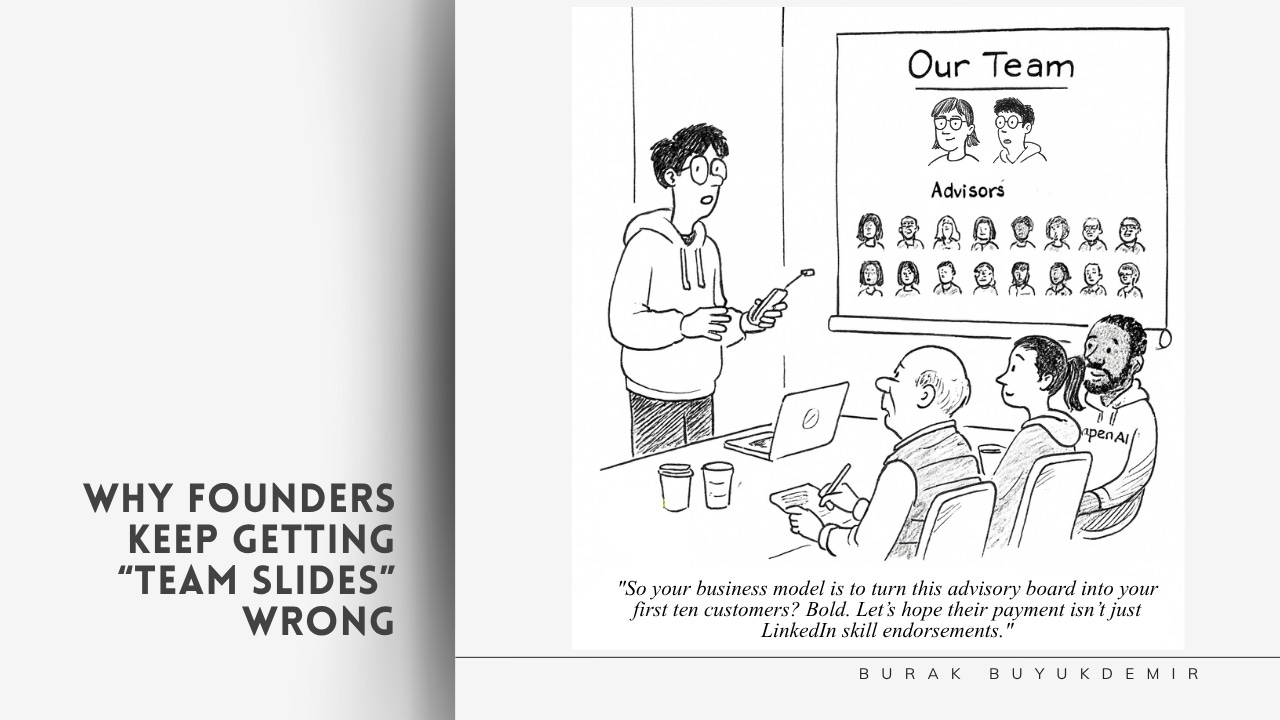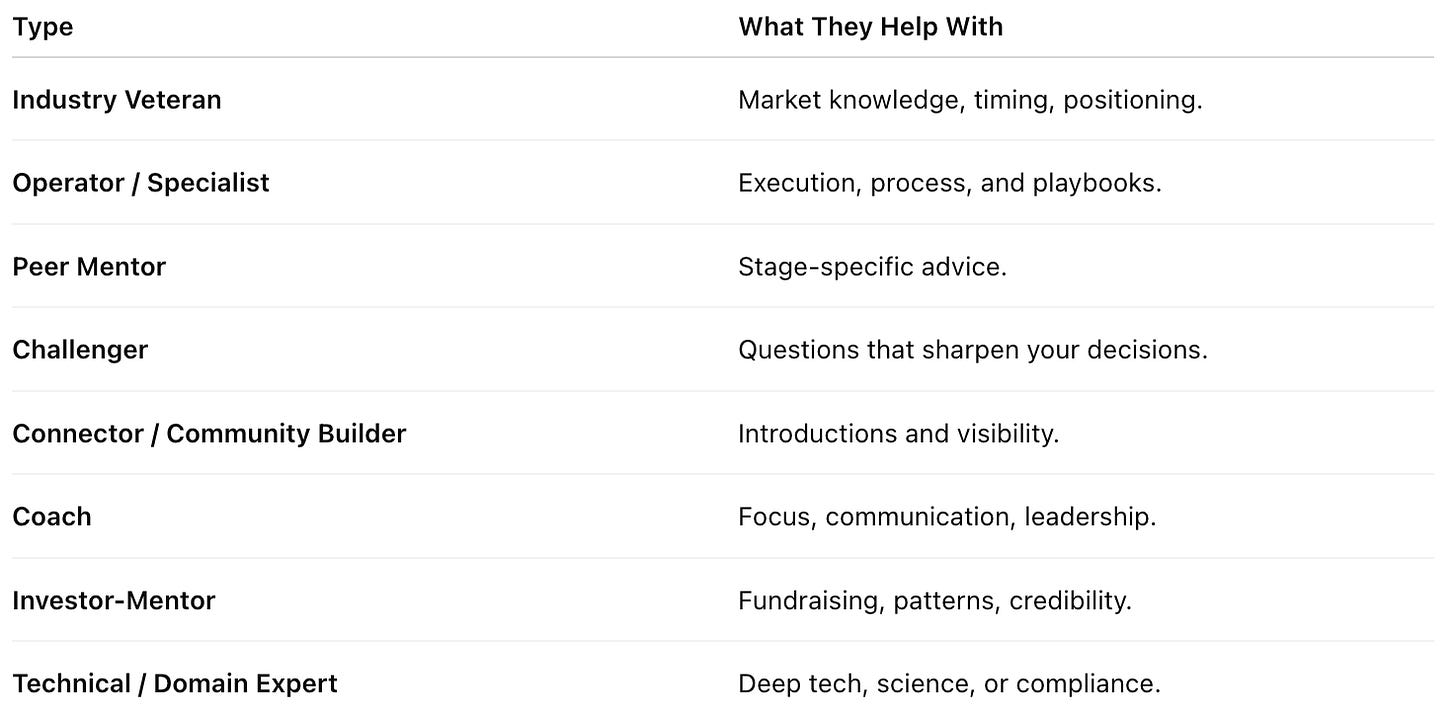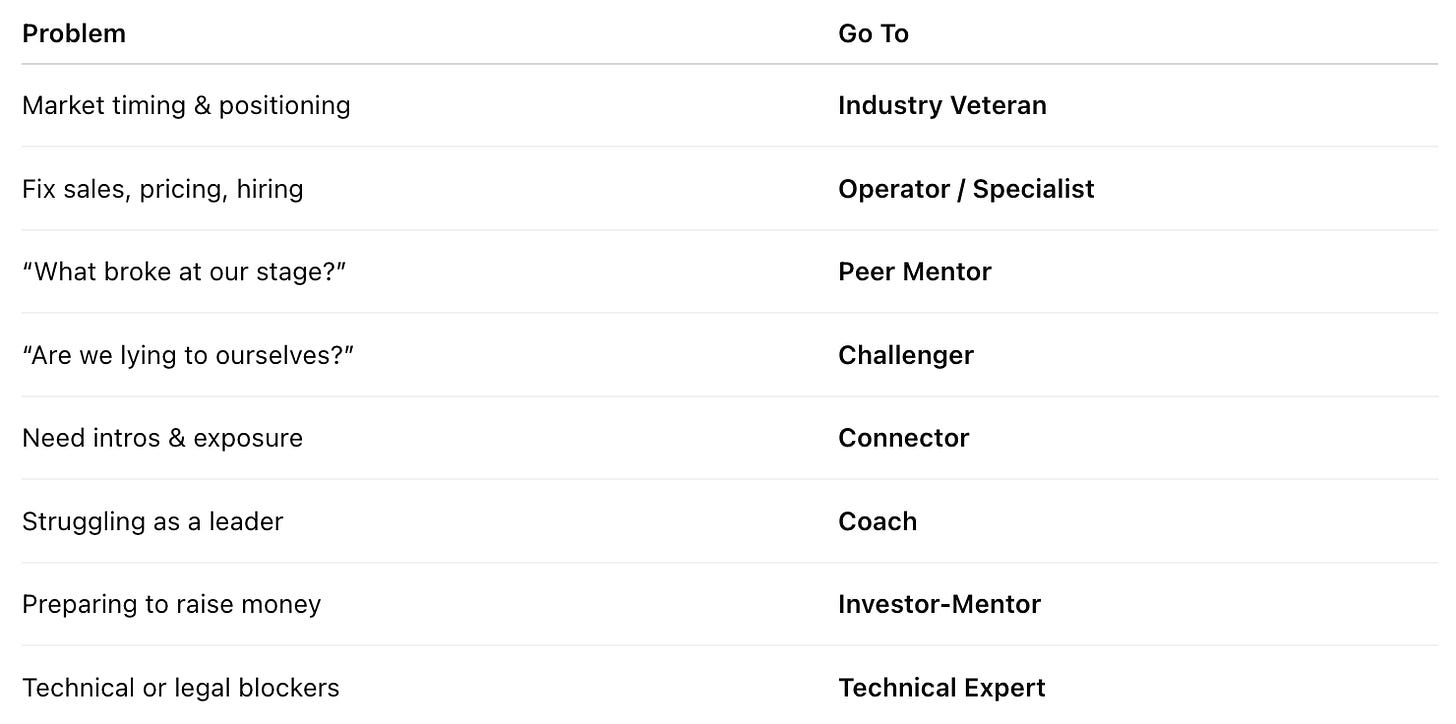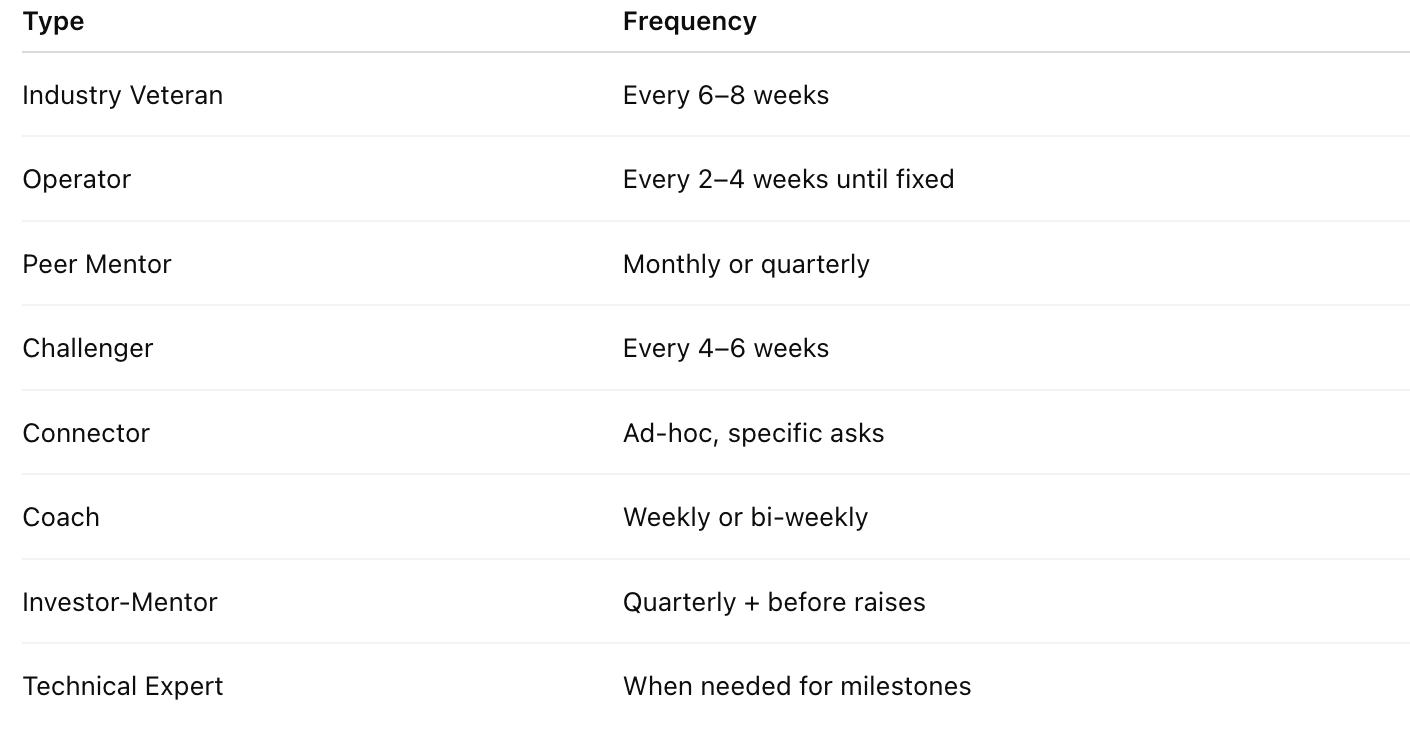Mentor ≠ Advisor
A simple way to understand who helps you and how.
For a long time, I’ve been fixated on one particular thing — the team slides in early-stage startup pitch decks.
Especially at the pre-seed and seed stages, I keep seeing the same pattern: the team slide shows more advisors than customers.
And not all of these “advisors” are really advisors. Many are simply friendly businesspeople who have allowed their names to appear in the deck to show support.
That’s when I realized how often people — including myself — mix up the terms Advisor, Consultant, Mentor, and Coach.
So I decided to start from scratch and really understand what each one means.
To be honest, I’ve caught myself confusing “advisor” and “mentor” more times than I’d like to admit.
These roles do overlap — the lines aren’t sharp — but still, it helps to know where one ends and the other begins.
There’s another issue too:
Many white-collar professionals who never made the leap to entrepreneurship like to position themselves as “mentors” or “advisors.”
Some are genuinely helpful. Others… not so much.
Founders need to protect themselves from unhelpful or even toxic relationships disguised as “mentorship.”
But that’s a topic for another post.
This one is Mentorship 101 — a simple guide to what these roles actually mean, what they do, when to use them, and how to think about them.
In truth, this started with a question to myself: “Could I explain this clearly if my son or daughter asked me?”
And I realized I couldn’t — at least not well.
So I went back, did my homework, and here we are.
What I thought would be a one-page note turned into a long read.
There’s more to this story, and I’ll dig deeper in later posts.
Why is there so much confusion?
In the startup world, titles have become a status symbol.
Many people don’t understand the difference between helping and managing.
And no — Mentor ≠ Advisor ≠ Coach ≠ Consultant.
1️⃣ Who does what?
There are many people who help founders. They are not the same.
Here’s how to tell them apart.
Advisor
Expert in one topic.
Gives structured help on clear goals.
Often gets small equity (0.1–1%).
Works a few hours a month.
Example: “Help us design our pricing model.”
✅ Use them for: clear outcomes.
❌ Don’t expect: emotional support or long talks.
Coach
Works on you, not your company.
Helps you think, decide, and lead better.
Paid monthly or by session.
✅ Use them for: clarity, focus, leadership, managing stress.
❌ Don’t expect: investor intros or product advice.
Consultant
Paid to build or fix something.
Has a project, a deadline, and a deliverable.
✅ Use them for: reports, research, marketing plans, UX design.
❌ Don’t expect: long-term relationship or ongoing advice.
Peer Group or Mastermind
A small circle of founders at a similar stage.
You share challenges and hold each other accountable.
Groups like EO, YPO, or Vistage require confidentiality.
✅ Use them for: learning from others, staying motivated.
❌ Don’t expect: expert guidance — this is shared experience.
Board Member
Legal director with fiduciary duties (care, loyalty, obedience).
Focuses on governance and big company decisions.
✅ Use them for: oversight, approvals, strategy.
❌ Don’t expect: day-to-day mentoring (some give it, but it’s not their job).
Sponsor
Senior person who speaks up for you and opens doors.
✅ Use them for: access, visibility, and introductions.
❌ Don’t expect: coaching or feedback — they help you get seen.
Fractional Executive
Part-time VP or CxO (1–3 days a week).
✅ Use them for: owning a function (sales, marketing, finance).
❌ Don’t expect: mentoring — they are managers.
Investor (with advisory role)
Puts in money and offers advice.
✅ Use them for: fundraising, key hires, connections.
❌ Don’t expect: daily operations help.
Trusted Advisor
A long-term relationship built on trust and good judgment.
✅ Use them for: sensitive topics, co-founder issues, investor relations.
❌ Don’t expect: reports or deliverables — they guide you.
2️⃣ What a Mentor Really Is
A mentor gives you wisdom, not work.
They’ve done what you’re doing and share what they learned.
✅ Mentors help you:
Think clearer.
Avoid mistakes.
See blind spots.
Meet the right people.
❌ Mentors do not:
Build your product.
Manage your team.
Do the work for you.
Mentors = Insight
Advisors = Execution
Coaches = Growth
Consultants = Deliverables
Boards = Oversight
🔁 Where These Roles Overlap
These roles aren’t hard boxes. The same person can play more than one role depending on the moment.
A mentor might become an advisor if they start giving you structured help on specific goals.
A coach may also act like a mentor if they’ve built companies before and share real stories.
A board member might become a trusted advisor if you speak outside formal meetings.
An investor often wears several hats — mentor, connector, and advisor rolled into one.
A fractional executive can coach their team while managing performance — half mentor, half operator.
A sponsor can become a connector if they introduce you to people in their network.
A trusted advisor often becomes your first call — combining bits of mentoring, coaching, and strategy.
The key is intent and boundaries:
👉 If they give you guidance, they’re a mentor.
👉 If they own results, they’re an advisor or executive.
👉 If they help you grow, they’re a coach.
👉 If they open doors, they’re a sponsor or connector.
3️⃣ The 8 Mentor Types Every Founder Should Know
4️⃣ Real People in Each Category
Industry Veteran
Ex-CEO, serial founder, industry insider.
Helps you see the big picture.
Operator / Functional Specialist
VP Sales, Growth, or Product leader.
Helps you fix real problems and build systems.
Peer Mentor
Founder 1–3 years ahead of you.
Shares what worked and what failed.
Challenger
Tough questioner.
Pushes you to think harder and focus.
Connector / Community Builder
Knows everyone.
Helps you get in the right rooms.
Coach
Professional listener and challenger.
Helps you make better personal and leadership decisions.
Investor-Mentor
Angel or VC who actually helps.
Guides you on fundraising, storytelling, and growth signals.
Technical / Domain Expert
Scientist, engineer, or policy specialist.
Keeps your product and compliance on track.
5️⃣ Who to Ask for What
6️⃣ How Often to Meet
7️⃣ How to Work With Mentors
Before meeting:
Send a short one-page brief:
Company (1 line)
Stage & numbers
Goal (next 60–90 days)
1–3 questions
3–5 key metrics
Decision deadline
After meeting:
Send a short follow-up:
Thank them.
Summarize what you’ll do.
Update them later with results.
Monthly update (under 200 words):
One key number that moved.
Three bullets: shipped / learned / changed.
One ask (intro, review, hire).
8️⃣ When to Formalize
Ask yourself:
“If they stopped tomorrow, would it delay my milestone?”
If yes → make them an Advisor (formal, equity, defined hours).
If no → keep them a Mentor (informal, flexible).
9️⃣ Red Flags
If you hear things like:
🚫 “You can put my name on your deck, but I don’t have time to meet.”
🚫 “I’ve seen it all.”
🚫 “I won’t invest, but I can be your advisor.”
🚫 “If you don’t work with me, you’ll regret it.”
🚫 Generic advice every time.
🚫 Always rescheduling.
🚫 Tries to sell you services.
🚫 Makes you dependent on their opinion.
🚫 Shares your info without permission.
→ Stop right there.
Those sentences are warning signs.
What a healthy mentor–mentee relationship looks like
Short, focused meetings at regular intervals.
Clear expectations: “What do you want from me?”
A short written summary after each meeting (follow-up).
The mentor’s value should show up in your decision quality, focus, and speed.
🔟 Key Rules to Remember
4–6 active mentors is enough.
Mentors guide; they don’t manage.
Show progress — mentors stay when they see results.
Don’t collect advice; act on it.
Fire cynics. Keep challengers.
1️⃣1️⃣ Final Takeaway
“I used to confuse these terms too.
But I realized that mentorship isn’t a title — it’s an attitude.
Some people give advice; others give time.
A great mentor doesn’t teach — they make you think.”
Mentors sharpen your thinking.
Advisors and consultants deliver outcomes.
Coaches build the leader inside you.
Treat mentorship like a product:
Define the job.
Send a brief.
Measure what changes.
Adjust your roster.
And when you’re ready, become the mentor you needed.
That’s how strong ecosystems are built.
📚 Sources & Further Reading
Mentorship & Advisory Roles
Founders Network – Startup Roles: Definitive Guide for Founders
Assured Strategy – What Is the Difference Between a Coach, Consultant, Advisor, or Mentor?
Janine Coombes – Definition: Coach, Consultant, Mentor, Trainer
Together Platform – Different Types of Mentoring and Their Uses
Peer & Mastermind Groups
The Alternative Board – Advisory Boards and Mastermind Groups
Deliberate Directions – Why Top Performers Choose Mastermind Groups
Boards, Advisors & Governance
The Corporate Governance Institute – What Does Fiduciary Duty Mean?
BoardEffect – Fiduciary Responsibilities of Nonprofit Boards
HSBC Innovation Banking – Leveraging Advisors for Startup Growth
Sponsors & Trusted Advisors
Mentorship & Coaching Research
Ecosystem & “Pay It Forward”






Nice one!
Thx Burak. Important distinctions.